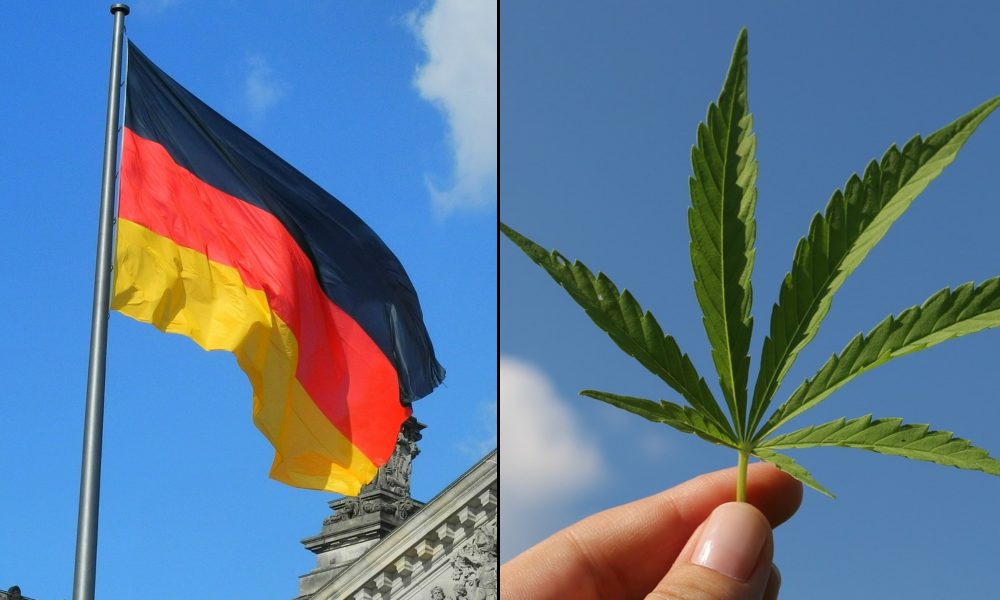A bill to legalize marijuana in Germany is officially on the legislative agenda for next week, signaling that plans to enact the reform by April are on track.
Advocates are cheering the development in the Bundestag, though the planned vote in the Finance Committee on Wednesday will need to be followed up with action by the Health Committee and then the full chamber.
The move to place the legislation on the agenda comes about two weeks after leaders of Germany’s so-called traffic light coalition government announced that they’d reached a final agreement, resolving outstanding concerns, primarily from the Social Democratic Party (SPD).
Lawmakers said the bill, originally brought forward last year by Federal Health Minister Karl Lauterbach, was being slightly revised to expand and expedite monitoring and reporting requirements related to the illicit market.
Georg Wurth, an activist and CEO of the German Hemp Association, said on Wednesday that the scheduling of the Finance Committee vote “makes it extremely unlikely that it will be stopped again now,” according to a translation.
“Other committees, especially health, and the Bundestag itself are likely to follow through next week,” he said.
Das #CanG steht für nächsten Mittwoch auf der Tagesordnung des Finanzausschusses. Es wird damit extrem unwahrscheinlich, dass es jetzt nochmal gestoppt wird! Weitere Ausschüsse, insb. Gesundheit, und der Bundestag selbst dürften nächste Woche durchziehen.https://t.co/IMbSpa9Fal
— Georg Wurth (@WurthGeorg) February 14, 2024
The agenda for next week also includes an opposing motion to “stop cannabis legalization” filed by the Christian Democratic Union and Christian Social Union (CDU/CSU) parliamentary group.
Members of the committee are also set to discuss the government’s response to the Federal Council that represents German states, which previously unsuccessfully sought to block the reform.
A final vote on the legalization bill that was initially planned for last month was ultimately called off amid concerns from SPD leaders.
Lawmakers had already delayed their first debate on the legislation, which was ultimately held in October, ostensibly due to the conflict in Israel and Palestine. They also pushed back a vote scheduled for November as supporters worked on improvements to the bill.
At a meeting in December, the health minister took questions from members, some of whom oppose legalization. At several points, he pushed back against lawmakers who suggested that legalization would send the wrong message to youth and lead to increased underage consumption, saying their arguments “misrepresented” the legislation.
Lawmakers also recently made a raft of adjustments to the bill, mostly designed to loosen restrictions that faced opposition from advocates and supporters in the Bundestag. They included increasing home possession maximums and removing the possibility of jail time for possessing slightly more than the allowable limit.
The legislators further agreed to stagger the implementation of the reform, making possession and home cultivation legal for adults beginning in April. Social clubs that could distribute marijuana to members would open in July.
Officials are eventually planning to introduce a complementary second measure that would establish pilot programs for commercial sales in cities throughout the country. That legislation is expected to be unveiled after its submitted to the European Commission for review.
Following the bill’s final reading in the Bundestag, it will go to the Bundesrat, a separate legislative body that represents German states. Members of the Bundesrat tried to block the proposed reform in September but ultimately failed.
—
Marijuana Moment is tracking more than 1,000 cannabis, psychedelics and drug policy bills in state legislatures and Congress this year. Patreon supporters pledging at least $25/month get access to our interactive maps, charts and hearing calendar so they don’t miss any developments.
Learn more about our marijuana bill tracker and become a supporter on Patreon to get access.
—
Lawmakers in the Bundestag recently held a hearing in the Health Committee, at which opponents criticized some elements of the proposal. The body also heard a competing policy proposal from The Union, a political alliance of the Christian Democratic Union and Christian Social Union (CDU/CSU), that would not legalize marijuana but instead “improve health protection and strengthen education, prevention and research,” Kappert-Gonther said at the time.
The health minister responded to early criticism of the bill from medical and law enforcement groups by emphasizing that the reform would be coupled with a “major campaign” to educate the public about the risks of using cannabis.
While Germany’s Federal Cabinet approved the initial framework for a legalization measure in late 2022, the government also said it wanted to get signoff from the EU to ensure that enacting the reform wouldn’t put them in violation of their international obligations.
The framework was the product of months of review and negotiations within the German administration and the traffic light coalition government. Officials took a first step toward legalization in 2022, kicking off a series of hearings meant to help inform legislation to end prohibition in the country.
Government officials from multiple countries, including the U.S., also met in Germany last November to discuss international marijuana policy issues as the host nation works to enact legalization.
A group of German lawmakers, as well as Narcotics Drugs Commissioner Burkhard Blienert, separately visited the U.S. and toured California cannabis businesses in 2022 to inform their country’s approach to legalization.
The visit came after top officials from Germany, Luxembourg, Malta and the Netherlands held a first-of-its-kind meeting to discuss plans and challenges associated with recreational marijuana legalization.
Leaders of the coalition government said in 2021 that they had reached an agreement to end cannabis prohibition and enact regulations for a legal industry, and they first previewed certain details of that plan last year.
A novel international survey that was released last year found majority support for legalization in several key European countries, including Germany.
New York Lawmakers Say Bill To Legalize Psilocybin-Assisted Therapy Has A ‘Real Chance’ To Advance This Year
Read the full article here









